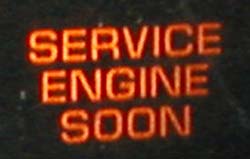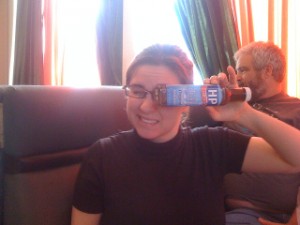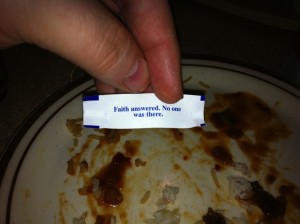I don’t really talk about myself.
Stuff I like, yes. Stuff I do, almost too much. I’ll make a lot of hay about my opinions. Sometimes, I seek an apology for a late podcast or some other technical malfunction. Even my personal blog/wiki, which no one reads, is more about my technical exploits than anything else.
If I’m going to talk about myself, I need a context that nearly forces me into it. The Living After Faith episode is a good example of that. But unless I’m forced (or I force myself) into it, I’ll avoid it. So much so that I’m now on the third paragraph and I still haven’t even said what this essay is about. So, here goes:
I am depressive.
Fairly badly, as far as these things go. I’ve lost hours to catatonia, lost weeks in bed, and lost my shit in some random way on so many occasions I’ve stopped counting or even remembering them. Wonder why I’m overweight? I don’t. It’s already cost me my teeth, the ones you see are all less than three years old. My hair has gotten so tangled from neglect that it required the mob to save it. Depression plays into my life so much that I’ve needed specialists to help me understand the magnitude.
I’m not going to divulge which “style” of depression I have– it’s known, somewhere, but I keep myself
in the dark to prevent myself from brooding over it. However, it’s not manic depression; for me, it’s a lot of down, and not very much “up,” and the wave is very bottom heavy.
The one thing I can say is that my self-destructive tendencies, when I have them, tend towards ruining rather than ending. So, luckily I’ve managed to escape being hospitalized for a major episode. On the other hand, I’ve never been hospitalized for a major episode. If I had, I might have had the help I needed a lot sooner.
This is the most public, and obvious, I’ve ever been about it. The only other times I’m this clear about it is in a hospital, in a clinic, or only recently with Becky.
I’m only being public with it now because I’ve seen a reason to be public about it. There have been a number of atheists in our community that have spoken about their illnesses and issues stemming from them, and I think it’s worked out very well for the community (and I hope personally). I completely believe in the need to destigmatize mental illness– my reluctance to talk about it has more to do with my enormous sense of showmanship than any desire to hide the fact that I am often not well.
I thought I should be public about it because my story is a little different from other people I’ve spoken with. First, religion never really took with me. Aside from what I talked about in my Living After Faith episode, religion wasn’t a part of my indoctrination or my life in general, and skepticism was. The second reason is a bit more subtle.
Many people in the atheism community suffer from PTSD, usually derived from incredibly traumatic experiences in religious contexts. And while I’ve had my share of traumatic experiences, I don’t think they scale quite to the level of some of the terrifying stories I’ve heard as a friend, and as a host of Ask an Atheist.
For me, it’s mostly genetics. In my family tree, there is a fair amount of depression, the occasional deeper mental illness, and a hell of a lot of substance abuse. I know there are going to be Christians out there who think atheism is the source of my trouble. As may be, but as I’ve pointed out before, half of my family is agnostic, and the other half is Christian. The other people in my family who experience what I have are from the Christian half. The agnostic half doesn’t seem to experience it quite as much.
I’ve no Christian programming that asserts itself at inopportune moments– something I’ve heard from friends who have left religion. So, in addition to furthering the discussion on mental illness, I thought I would talk about what godless depression management feels like.
A Better Answer to an Old Question
One of the questions we get on Ask an Atheist a lot is what to do or say when someone says, “God Bless You,” or “don’t worry, God has a plan for your life!” You may have also noticed that I’ve never felt like I’ve had a good answer for it.
I had been giving it a lot of thought. This is something I should have a good answer for! It really seems to bother people, and in hindsight it can be pretty despicable. Here is a religious person using someone’s personal pain as a marketing technique for a venerable pyramid scheme.
For me, the “God” concept only took hold when I was seeking social acceptance, or when I was being manipulated by others. Left to my own devices, it takes the force of will to hold on to the “God” concept. During a depressive moment, will is something I lack.
When “God” is invoked for me in a moment of weakness, I don’t have anything to say because I don’t have anything to think. Any anger or pleasant redirections I might have about “God having a plan for my life” are an afterthought, when I’ve come to my senses. When I’m in the moment, I’m just confused.
I only figured this out recently. I was out in front of Doyle’s at a post show trying to get under control after something hit me in just the wrong way. It must have been clear on my face that I was in some trouble, as an older guy on the street informed me that “God loves you!.”
It had no impact. The man himself did: I was partly relieved that my distress was noticed, partly annoyed that I was being talked to while I was trying to get myself under control, and very, very embarrassed. The words themselves were meaningless. “Thou art God” would have worked better. At least I’d get the reference. The words themselves, and the thoughts behind them, are a code I don’t know how to translate.
People have been saying this to me for years, and it just bounced off of me. It occurs to me right now how unnerving that might have been to an adult trying to console a 16 year old me. That’s one I’ll need to think about for further disposition.
I’ve never had any idea what to say to people who invoke “God” because I’ve never had anything to say, even in situations where it happens to me. It’s not something I’ve ever felt the need to defend against. So the best thing I can offer for these situations is: “Buh.” It’s what I usually say. I think as we start having more ethnic atheists out there, we’ll be seeing this a lot more.
Afterwards, when I come to my senses, I’ve observed different ideas. People who invoke “God” for their own personal support never bothered me. Their business, their beliefs, not mine. I know that’s probably an odd position to take for someone who aspires to talk about atheism professionally, but I’m serious when I mean I’m not all that evangelical.
What does bother me are folks who invoke “God” for me, even if I know that they’re invoking “God” for me for their own benefit and support. The reason for this is the answer to a different question that I get a lot.
The essential version of this question is, “If not God, then what?” There are a million other forms to the question, the darkest of which is “If you don’t believe, what stops you from killing yourself?” This is a question I recently had to admit that I didn’t have a good answer for in my current emotional state.
The answer is responsibility, and the joy of responsibility.
I place responsibility for myself on myself. Earlier, when I said “it” caused bad things to happen to me, even as I was writing it I thought to myself, “I shouldn’t say it there, I should say me.” My illness is in my mind, which means it’s a part of me, and a part of my identity. It may not be something I like or want, but that just makes it one of a number of things that are in my identity that I wish I could part with.
When things get rough, I think about the responsibility I have for myself. I realize that while I may have help from friends and loved ones, the job of getting myself out of bed, of getting the medical care that I need, of fulfilling my commitments… that job is mine and mine alone.
That responsibility gives me agency over my life. It gives me direction. It gives me confidence and resolve. It lends willpower to me. To me, that responsibility is literally Awesome. Using that responsibility– climbing out of the hole and taking charge of my life– fills me with joy.
Responsibility, and the joy of responsibility.
 To say that I should give that responsibility up to “God–” that I should have my sins washed in the blood of Jesus, that Allah will forgive, or that it’s all my karma– is emotional burglary. You’re attempting to steal the very tools I use to fix myself. With responsibility out of my hands, I lack strength, I lack resolve, and recovery is joyless because the recovery was not mine.
To say that I should give that responsibility up to “God–” that I should have my sins washed in the blood of Jesus, that Allah will forgive, or that it’s all my karma– is emotional burglary. You’re attempting to steal the very tools I use to fix myself. With responsibility out of my hands, I lack strength, I lack resolve, and recovery is joyless because the recovery was not mine.
Screw that.
Of course, it’s not perfect. Responsibility is not a magic word, and my depression is still a part of my identity. Sometimes, I fall down, or think I don’t have it in me anymore. Sometimes, I forget and run away. I still do dumb and ridiculous things. Trust me, that happens, frequently and recently.
After a couple of times of being forced or coaxed out of my cave, I learned that sometimes, putting one step in front of another is the first step in taking control, even if you don’t think you’ve got it in you. Especially if you don’t have it in you. And, somehow, it works.
This is something I do not know how to share. How do I explain the joy of responsibility to someone who, through age or contract, feels that they’ve lost responsibility for themselves? I have no answer, yet. All I can say is that my life didn’t begin until I took that control, and it was earlier than you’d expect. There were times that I’ve had to pay for that responsibility, but it has led to a life that is inescapably mine, and one that I’m proud of.
What I Learned From Dr. Dennett (this week)
Another coping mechanism that I have is what I’m now learning to call metacognition, thanks to Daniel Dennett and his recent book. To be honest, I was never really sure what to call it before. The best thing that I had was “thinking within your thinking” from the novel Dune. I’d heard the word “metacognition” before, but I was never sure that it was what I was doing.
So, you can imagine why I was interested in it when Dr. Dennett was in town.
Basically, I pay attention to what I’m doing, and what motions my thoughts are moving in. But that leads me in some strange directions that have me saying things that aren’t exactly what you hear when it comes to depression.
There’s a lot of ways I’ve noticed my brain is out of alignment, but let’s talk what’s driving me to write this article: two months ago. I wish I could tie this to a specific event, but nothing comes to mind. It just started happening.
In my self assessment, I think my life is good. I’m transitioning out of a career and lifestyle that gave me a lot of stress, allowing me to rediscover what I liked about that career in the first place. I’m finally getting to follow one of my childhood dreams: I’m doing talk radio. The show could even be called successful for small values of the word. I’m in one of the most rewarding and positive relationships I’ve ever known. I’ve got her back, she has mine. I’m in a town I like living in, and one that seems to like me a little. I drive a fun car.
Then, I check how I’m feeling about it. I spend a lot of my time worrying that I’m no longer a “provider,” now that my career is over, and then immediately hating myself for how chauvinist that sounds. I’m constantly fretting over the radio show, its survival, and its value to the community. Becky and I argue a lot. I go through my week feeling very little, and what feeling there is, is negative.
Clearly, something is wrong with my head. Time to talk to the doctor.
The odd thing here is that I’m recognizing that my emotions are not valid, something that experts on depression tell you not to do. Sort of. I hear people saying that a lot, and I’ve had professionals tell me that, but I don’t think that’s what they mean when I follow-up on it.
What I am not saying is that I ignore my emotions. They exist, they’re in my head, and I’m feeling them whether I admit them or not. Suppression doesn’t work. They’re real emotions, and I have to examine them, so in that sense they’re valid. On the other hand, the emotions don’t seem to correspond to anything or are completely out of sync with what I would normally feel. Logically, I can see the good parts of my life, but I don’t feel them.
If my negative emotions are the “CHECK ENGINE” light on a dashboard, it would be lit. But ironically, the problem isn’t with the engine. The problem is the “CHECK ENGINE” light. So how the hell am I going to know if something actually bad happens?
 The answer is that I get an ODB2 reader, and that’s where my metaphor ignobly dies. What I actually do is use my logic and reasoning skills to test my emotions. Even in my emotional life, reason, logic, and skepticism are playing an important part. What’s more important is what reason, logic, and skepticism are doing: they’re helping me carve a path back to joy. Not exactly something expected by people who see skepticism as an inherent negative, even in the atheism community.
The answer is that I get an ODB2 reader, and that’s where my metaphor ignobly dies. What I actually do is use my logic and reasoning skills to test my emotions. Even in my emotional life, reason, logic, and skepticism are playing an important part. What’s more important is what reason, logic, and skepticism are doing: they’re helping me carve a path back to joy. Not exactly something expected by people who see skepticism as an inherent negative, even in the atheism community.
So this time, I scheduled an appointment with my doctor. I answered some questions, explained my history, and told him what I’ve been on and what worked. I’m still in the adjustment phase. I’m still moody and weird things happen, and I feel like I’m on enough drugs to put a horse on the moon, or to make someone else feel like putting a horse on the moon is a good idea.
But I’m improving. Not only am I less depressed, I’m less angry, which is an entirely different conversation. I’m noticing things that I hadn’t before. For example, I noticed that caffeine before the show makes me jumpy and causes me to stutter, so now I try not to have any before a show. I wouldn’t have noticed that without being able to relax.
Once again, it doesn’t always work, and it’s not a panacea. Sometimes, reason is just beyond me at the moment. Eventually though, an opportunity comes along where I can use it, often on something inconsequential, and it sort of cascades from there. Taking advantage of those moments is something I’ve had to learn.
I don’t think this mindset will work for everybody, and I don’t even know if it works for anybody. I do suspect that as we get more ethnic atheists, we’ll see more of this around.
Not Everything Works
Another thing I do is much more common. I keep myself busy so I don’t get depressed. Or, maybe I should say that I keep busy so I never have a chance to notice that something weird is going on. I’ve never been too sure.
This approach has a lot of advantages. I may not have a lot of formal education, but I do have a lot of hobbies which have taught me quite a bit in a jack-of-all-trades sort of way. I can brew a good cider, turn that cider into usable vinegar, do a stupid amount of things with a computer, make mayo from scratch, build a radio, occasionally tell a joke, and be marginally entertaining on a show. All in the service of staying busy. I’m hardly alone, but I’m proud of that.
There’s huge flaws here, though. One, I over-commit, which means I let people down, which can set me off. As I’m getting older and learning my boundaries, I’m improving on that. Another flaw is that eventually, I have to stop doing things. That has two very dangerous effects. First, I don’t sleep very much. It used to be that if I stopped working, I’d have nothing to stop the bottom from falling out, so I worked until I (quite literally, on a number of occasions) passed out. I’ve improved on that a lot in the last few years, but a regular sleeping schedule still eludes me, to the point where we’re trying to figure out if I actually have a sleep disorder or not.
The other one is that eventually, I do have to stop. Right now, the darkest part of my week is Sunday night. The show is over, post show is over, everything is encoded and online, and now I’m the farthest point away from the highlight of my week and I’m supposed to be “resting.” In the past, things have really fallen apart there. The drugs have helped, and starting in on a relaxing project has helped. Still have my off days, though.
I look at how many over-committers we have in the atheism movement, at least here in the Puget Sound area, and I wonder if I’m alone in over-committing, or if everyone else is just really into it. Don’t get me wrong: I love working in this community, it’s one of the best decisions I’ve ever made. I just hold no illusions about what brought me here. I continue to work on the show and be a part of this community because I love it, but I can’t pretend I wasn’t trying to avoid something.
Which Way is Up?
Right now, I’m wondering if I should go back into therapy. To be honest, I really haven’t done a whole lot of it. Some of it was incredibly rewarding and is well reflected in my coping mechanisms, some of it was the usual pet theory stuff, and a lot of it was just me talking, which I never felt comfortable with.
Last time I spoke with one, a number of years ago now, he told me my tools were good ones. He didn’t say I didn’t need therapy, but he did ask me if I thought I needed therapy. At the time, I didn’t, and honestly, I don’t right now. Things appear to be working out well now. But if it would help, I should seriously consider it.
And then figure out how to pay for it. Even worse, find a therapist I don’t instantly want to shoot into the sun.
That last therapist also told me that what I’ve got is something I’m going to manage, rather than something that gets cured. “Expect it to come back, and stay sharp”, is what I remember. I don’t think anyone actually said that, but years have warped it into that, and it seems to serve me well.
It leaves me wondering: what happens next?
POSTSCRIPT ONE:
I’m really not looking for sympathy. If you’ll look again, I know my life is good, and I talk about people who need more support than I do every week. Emotionally, the thing I’m most going to want is to pretend I never wrote it.
Logically, even if I can avoid having “The Depressed Atheist” on the tombstone I’ll never have, I know I can’t undo this. It’ll be something people know about me, if they know about me at all. Even more, it would be stupid to avoid talking about it. I didn’t write this piece as a therapeutic tool, I wrote it because I thought it could serve the community. I should follow through with that.
I’m also not seeking advice. I’ll listen, but unless you’re an extremely well-degreed professional who believes I’ve talked myself into being a psychopath, or you’re more sure about what you have to say than you are about gravity, leave it off for now, please.
What I do want is to have this story be a part of the narrative, in the hopes that in some way it can help people understand themselves or the atheists around them. I know that means that I will have to follow up with this, as hard as it might be for me.
The timing of this post and my upcoming tour is intentional. I can’t pretend there isn’t going to be an emotional hit for me here, but getting to travel, to meet a lot of people, and do what I love will go a long way towards offsetting it. This tour is going to be about the people I meet, not this post.
POSTSCRIPT TWO:
If you identify with me here and aren’t getting treatment, you should see a qualified professional. Getting help isn’t an admission of weakness, it is a strength of character. That’s something that took me too long to learn, at a high cost.
There are other folks in the community who are talking about this, as I found out when I was deciding if I should do it or not. They’re all important, and you should see them:
- JT Eberhard’s Posts (1, 2), and a talk
- Ellen Lundren
- Miri of Brute Reason
- Greta Christina (1, 2)
Thanks to all of you for the context, even if I’m still not quite there enough to read them all the way through. Also thanks to Greta for a pile of other things.





